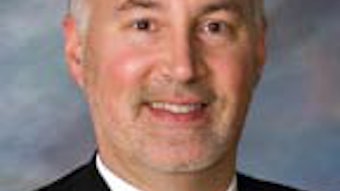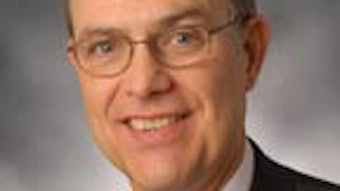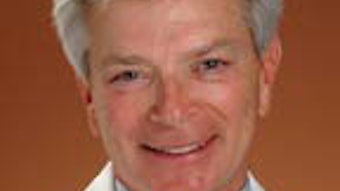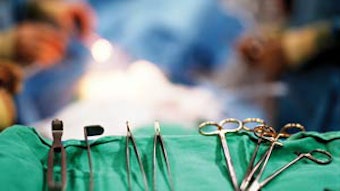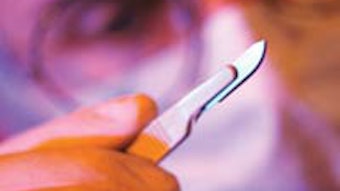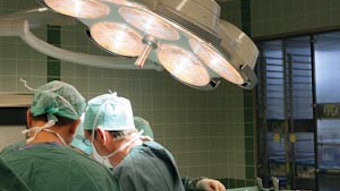HEALing Head and Neck Cancers in Underserved Communities
Charles E. Moore, MD Atlanta, GA After becoming Chief of Service at Grady Health System, in the Emory University Department of Otolaryngology, I met with numerous patients who sought medical care only after their cancer had progressed to the point where they had limited treatment options. When I continued to see such patients on an almost daily basis, I decided I could do more to increase awareness of head and neck cancers. I identified the three ZIP codes in Atlanta that represented the highest percentages of head and neck cancers that I saw in my clinic and were in medically underserved areas. I made it a priority to address this head and neck cancer disparity. I began to provide educational talks on and screenings for head and neck cancers around Atlanta, focusing primarily on homeless shelters and faith-based institutions in the three ZIP codes. As I learned from the community what its needs were, I began to encourage my colleagues and residents to participate in this activity. If health problems or suspicious lesions were found, individuals were referred to appropriate healthcare professionals for long-term treatment. About 80 percent of people who were found to have lesions of concern kept their follow-up appointments in our otolaryngology clinic for definitive treatment. In all, I found early cancerous lesions in 9 percent of the persons whom I had screened. In 2004, I founded Health Education, Assessment, and Leadership (HEAL) (www.HEALingOurCommunities.org) to provide health education and medical services to underserved areas. This program, which began as a mobile educational resource out of my car, was later replaced by a mobile unit. Subsequently, I developed the concept for the HEALing Community Center (HCC), a free medical facility that would provide health education and primary and specialty care in the ZIP codes that need them the most. Through collaborations with multiple medical, faith-based, community, and academic organizations, the HCC provides direct services in a medically underserved inner-city area in Atlanta. The facility addresses the increasing health disparities among minorities and uninsured individuals in poverty. My experience shows that as a medical volunteer, you can be a part of the solution. No action is too small. Whether your focus is at the local, national, or international level, you can make a tangible difference to direct patient care, medical education, public health, or the improvement of health care infrastructure. In the process, you will also introduce hope and possibilities to those who are too often underserved. To learn more about the HEALing Community Center, contact me at: cemoore@emory.edu.
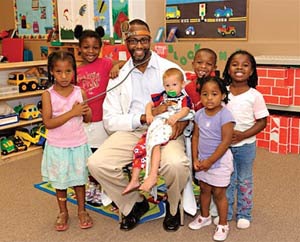 Dr. Charles Moore visits with children after health education class. Photo courtesy of Lyle Photography.
Dr. Charles Moore visits with children after health education class. Photo courtesy of Lyle Photography.Charles E. Moore, MD
Atlanta, GA
After becoming Chief of Service at Grady Health System, in the Emory University Department of Otolaryngology, I met with numerous patients who sought medical care only after their cancer had progressed to the point where they had limited treatment options.
When I continued to see such patients on an almost daily basis, I decided I could do more to increase awareness of head and neck cancers. I identified the three ZIP codes in Atlanta that represented the highest percentages of head and neck cancers that I saw in my clinic and were in medically underserved areas.
I made it a priority to address this head and neck cancer disparity. I began to provide educational talks on and screenings for head and neck cancers around Atlanta, focusing primarily on homeless shelters and faith-based institutions in the three ZIP codes.
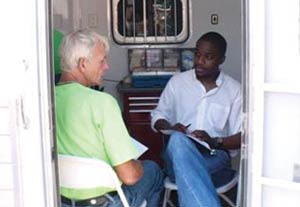 A patient talks with ENT resident Dr. Ajani Nugent in a mobile unit at a community head and neck cancer-screening event.
A patient talks with ENT resident Dr. Ajani Nugent in a mobile unit at a community head and neck cancer-screening event.As I learned from the community what its needs were, I began to encourage my colleagues and residents to participate in this activity. If health problems or suspicious lesions were found, individuals were referred to appropriate healthcare professionals for long-term treatment. About 80 percent of people who were found to have lesions of concern kept their follow-up appointments in our otolaryngology clinic for definitive treatment. In all, I found early cancerous lesions in 9 percent of the persons whom I had screened.
In 2004, I founded Health Education, Assessment, and Leadership (HEAL) (www.HEALingOurCommunities.org) to provide health education and medical services to underserved areas. This program, which began as a mobile educational resource out of my car, was later replaced by a mobile unit.
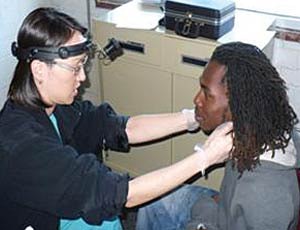 ENT resident Dr. Elina Kari (left) examines a patient during a head and neck cancer evaluation at the HEALing Community Center at City of Refuge.
ENT resident Dr. Elina Kari (left) examines a patient during a head and neck cancer evaluation at the HEALing Community Center at City of Refuge.Subsequently, I developed the concept for the HEALing Community Center (HCC), a free medical facility that would provide health education and primary and specialty care in the ZIP codes that need them the most. Through collaborations with multiple medical, faith-based, community, and academic organizations, the HCC provides direct services in a medically underserved inner-city area in Atlanta. The facility addresses the increasing health disparities among minorities and uninsured individuals in poverty.
My experience shows that as a medical volunteer, you can be a part of the solution. No action is too small. Whether your focus is at the local, national, or international level, you can make a tangible difference to direct patient care, medical education, public health, or the improvement of health care infrastructure.
In the process, you will also introduce hope and possibilities to those who are too often underserved. To learn more about the HEALing Community Center, contact me at: cemoore@emory.edu.







